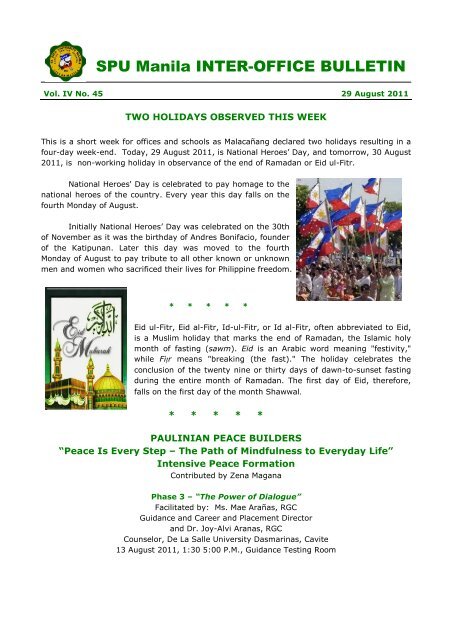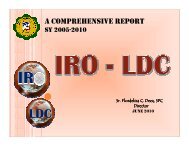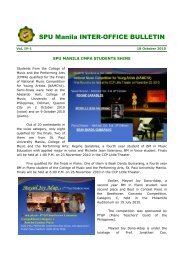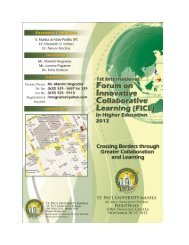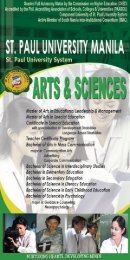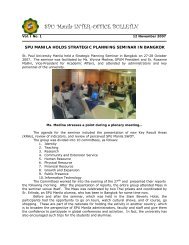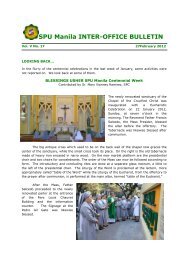SPU Manila INTER-OFFICE BULLETIN - St. Paul University Manila
SPU Manila INTER-OFFICE BULLETIN - St. Paul University Manila
SPU Manila INTER-OFFICE BULLETIN - St. Paul University Manila
Create successful ePaper yourself
Turn your PDF publications into a flip-book with our unique Google optimized e-Paper software.
<strong>SPU</strong> <strong>Manila</strong> <strong>INTER</strong>-<strong>OFFICE</strong> <strong>BULLETIN</strong><br />
Vol. IV No. 45 29 August 2011<br />
TWO HOLIDAYS OBSERVED THIS WEEK<br />
This is a short week for offices and schools as Malacañang declared two holidays resulting in a<br />
four-day week-end. Today, 29 August 2011, is National Heroes’ Day, and tomorrow, 30 August<br />
2011, is non-working holiday in observance of the end of Ramadan or Eid ul-Fitr.<br />
National Heroes' Day is celebrated to pay homage to the<br />
national heroes of the country. Every year this day falls on the<br />
fourth Monday of August.<br />
Initially National Heroes’ Day was celebrated on the 30th<br />
of November as it was the birthday of Andres Bonifacio, founder<br />
of the Katipunan. Later this day was moved to the fourth<br />
Monday of August to pay tribute to all other known or unknown<br />
men and women who sacrificed their lives for Philippine freedom.<br />
* * * * *<br />
Eid ul-Fitr, Eid al-Fitr, Id-ul-Fitr, or Id al-Fitr, often abbreviated to Eid,<br />
is a Muslim holiday that marks the end of Ramadan, the Islamic holy<br />
month of fasting (sawm). Eid is an Arabic word meaning "festivity,"<br />
while Fiṭr means "breaking (the fast)." The holiday celebrates the<br />
conclusion of the twenty nine or thirty days of dawn-to-sunset fasting<br />
during the entire month of Ramadan. The first day of Eid, therefore,<br />
falls on the first day of the month Shawwal.<br />
* * * * *<br />
PAULINIAN PEACE BUILDERS<br />
“Peace Is Every <strong>St</strong>ep – The Path of Mindfulness to Everyday Life”<br />
Intensive Peace Formation<br />
Contributed by Zena Magana<br />
Phase 3 – “The Power of Dialogue”<br />
Facilitated by: Ms. Mae Arañas, RGC<br />
Guidance and Career and Placement Director<br />
and Dr. Joy-Alvi Aranas, RGC<br />
Counselor, De La Salle <strong>University</strong> Dasmarinas, Cavite<br />
13 August 2011, 1:30 5:00 P.M., Guidance Testing Room
This program aims to enable participants to recognize and understand the nature and dynamics<br />
of conflict, debate vs. dialogue, and its relationship with peace, to appreciate and internalize<br />
the “Power of Dialogue,” to handle conflicts and issues that challenge them in non-adversarial<br />
situations, and to practice facilitation skills.<br />
Dr. Joy facilitates activities on debate vs. dialogue.<br />
Ms. Mae explains the concepts of conflict, the power of dialogue and T-cell<br />
(transformative cell which symbolizes its being a catalyst for change<br />
as the program aims to build a community of people who will choose<br />
a mindset of listening and understanding, rather than debating.<br />
This was initiated by the Conflict Resolution Group Foundation).<br />
Ms. Ellazar simulates<br />
the “power of dialogue”<br />
in non-adversarial situation.
The <strong>Paul</strong>inian Peace Builders practice being student facilitators<br />
in the T-cell (transformative cell).<br />
<strong>Paul</strong>inian Peace Builders with Ms. Ellazar, Moderator (far left),<br />
Ms. Arañas, Guidance Director (far right), Dianne,<br />
representative from Conflict Resolution Group Foundation, (beside Ms. Arañas)<br />
and Dr. Joy Arañas, Counselor-DLSU Cavite (center back)<br />
Sharing from a participant<br />
Phase 3 – The Power of Dialogue<br />
Contributed by Abigail Jane A. Babanto, BSFMA 4<br />
<strong>Paul</strong>inian Peace Builder member
In this last phase of the intensive peace formation, which took place on 13 August 2011, we<br />
had various activities, which all of us enjoyed so much we did not realize that it was almost<br />
time to go. I for one thought it was still early until I looked at my watch and saw that it was<br />
already 5:00 P.M. Our speakers, Mr. and Mrs. Joy Arañas, were really great in conveying the<br />
“Power of Dialogue.”<br />
When I heard the word “dialogue,” for me it meant exchanging of thoughts and ideas<br />
with one or more persons through words. One topic which made me sit straight and listen<br />
carefully was the T-cell, which was under the CORE group project.<br />
T-cell means “transformative cell” because it symbolizes being a catalyst for change as<br />
the program aims to build a community of people who will choose a mindset of listening and<br />
understanding rather than debating. Practitioners of T-cells have the mission to create, nurture,<br />
and sustain an institutionalized communication mechanism imbued with the spirit and skills in a<br />
non-adversarial process.<br />
From this phase, I learned that everyone can help to create a peaceful environment and<br />
the only thing one needs to do is to listen carefully to people and understand them. We should<br />
not judge people based on their color, race, physical appearance, and gender because all of us<br />
are equal in the eyes of God for He created us in His own image and likeness (Gen.1:26).<br />
A debate always has the pro’s and the con’s. Two parties are at odds with each other<br />
therefore creating a conflict between them or with other sectors who may have an unswerving<br />
commitment to a point of view, approach, or idea. An example of this is the exercise we had<br />
wherein we were divided into two groups. The first group was the family of the hunter and<br />
Little Red Riding Hood, and the other was the family of the wolf.<br />
However, a dialogue is much more organized than a debate; it follows a sequence and<br />
people are allowed to speak as individuals whose own unique experience may differ in some<br />
aspects from others on their side. An example of this is the T-cell, which we experienced in our<br />
own ways in the allotted time for the exercise. Our topic that day was “Internet, Facebook, and<br />
Twitter:source of relaxation or source of stress.” Most of us chose source of relaxation while a<br />
few chose source of stress. The facilitator only listened to our discussion and signaled us if she<br />
or he thought that what we were saying was out of the topic so that we may complete the task<br />
given to us. In a nutshell, t-cell tackles about how important dialogue is in our lives and how<br />
we can show others how we feel about them in an amicable manner, thereby demonstrating the<br />
difference between a debate and a dialogue.<br />
PAULINIAN ALUMNA IN THE NEWS<br />
AMBASSADOR PUYAT-REYES ATTENDS INAUGURAL CEREMONY<br />
OF PERUVIAN PRESIDENT, OLLANTA HUMALA<br />
A report to the Department of Foreign Affairs in <strong>Manila</strong> stated that Philippine Ambassador to<br />
Chile, Maria Consuelo Puyat-Reyes, in her role as Special Envoy and Personal Representative of<br />
Philippine President Benigno S. Aquino III, attended the inaugural ceremonies of newly-elected<br />
President Ollanta Humala on 28 July 2011 in Lima, Peru. She conveyed the congratulations of<br />
the Philippine President to the new Peruvian leader, as well as his best wishes for the latter’s<br />
success in all his endeavors. (Ambassador Reyes is an alumna, AB-BSE 1957.)
Ambassador Maria Consuelo Puyat-Reyes greets Peruvian President Ollanta Humala<br />
and First Lady Nadine Heredia at his swearing-in in Lima, Peru.<br />
Ambassador Maria Consuelo Puyat-Reyes, Vice Dean of the Diplomatic Corps in Chile,<br />
presents a silver platter to Msgr. Giuseppe Pinto, Dean of the Diplomatic Corps,<br />
after delivering her farewell speech in a ceremony honoring him.<br />
It is interesting to note that Msgr. Guiseppe Pinto has been assigned Papal Nuncio to the<br />
Philippines following his assignment in Chile. The Vatican aide was born on 26 May 1952 in Bari,<br />
Italy. He was ordained priest on 1 April 1978. Archbishop Pinto is a canon lawyer and fluent in<br />
four languages, speaking not only his native Italian, but also French, English, and Spanish.
SHARING… SHARING…SHARING<br />
<strong>St</strong>. <strong>Paul</strong> <strong>University</strong> <strong>Manila</strong><br />
<strong>St</strong>. <strong>Paul</strong> <strong>University</strong> System<br />
Graduate School<br />
HRM-D <strong>St</strong>udents<br />
in Action<br />
Contributed by Sandip Badwal<br />
and Dr. Portia Zoleta-Vitug<br />
Graduate school students who took up Human Resource Management and Development under<br />
Prof. Portia Zoleta-Vitug recently organized a job fair. The activity entitled "Help Beat the Heat<br />
of Unemployment" aimed to give opportunities to those who are unemployed, to facilitate the<br />
hiring needs of local companies, to meet the employment needs of local job seekers, and to<br />
stimulate and promote the local economic and employment climate.<br />
The fair was held in the <strong>SPU</strong> <strong>Manila</strong> Conference Hall on 13 August 2011 from 1:00 to<br />
5:00 P.M. Companies from different sectors, such as a language school, business firms, call<br />
centers, agencies, etc. participated in the activity, together with applicants and graduating<br />
students of <strong>SPU</strong> <strong>Manila</strong>.<br />
The activity started with a prayer, followed by the ribbon cutting done by Dean Elizabeth<br />
Ramos, assisted by Prof. Portia Zoleta-Vitug and Sandip Badwal (Chairperson), and the opening<br />
remarks by Dean Ramos.<br />
It was indeed a great opportunity for all of us to be involved in this activity because we<br />
gained new experiences, made new friends, and became familiar with new companies.<br />
We were able to help the attendees by giving them career opportunities. We hope<br />
there will be many more job fairs in <strong>SPU</strong> <strong>Manila</strong> in the future.<br />
Ribbon<br />
cutting<br />
Welcome remarks<br />
by Dr. Elizabeth D. Ramos<br />
(Dean, Graduate School)
Job fair slogan (ECO inspired)<br />
HRM & D class with Dr. Portia Vitug<br />
For our guidance …<br />
PRESIDENT AQUINO AND THE RH BILL<br />
Dr. Bernardo Villegas<br />
The <strong>Manila</strong> Bulletin<br />
29 August 2011<br />
As a long-time critic of population control measures, I respect the views of President Benigno<br />
Aquino III on the RH Bill. He has supported its inclusion into the priority bills recommended by<br />
LEDAC because he is sincerely convinced that population control is indispensable to the<br />
reduction of mass poverty in the Philippines. He has arrived at this conclusion after consulting<br />
with many of the expert economic advisers in and outside his Administration. I know for a fact<br />
that the vast majority of them are neo-Malthusians in orientation. They are convinced that<br />
rapid population grow this a major reason for the high incidence of poverty in the Philippines. It<br />
is difficult to blame the President for listening to their advice.<br />
I will not repeat here the many economic arguments I have used to counter the view that<br />
population growth is a major cause of poverty. I have written numerous articles about the<br />
very positive dimensions of population growth. In fact, I just came out with a book entitled<br />
precisely The Positive Dimensions of Population Growth that is available in all the major<br />
bookstores in <strong>Manila</strong>. What I want to tell the President here is that he is taking a very shortterm<br />
view of the problem of what is called in the Philippine Development Plan, 2011-2016<br />
"inclusive growth." Even assuming, without granting, that population control can help in the
important task of eradicating poverty in the Philippines, I would like to point out to the<br />
President that he is ignoring the long-term consequences of distributing artificial contraceptives<br />
for free to the poor. There is enough hard evidence in other countries that followed the same<br />
path of population control which shows that a contraceptive mentality inevitably leads to a<br />
significant rise in abortion, divorce, single mothers and mentally unbalanced adolescents.<br />
The President and his advisors may completely disregard the prophecy made in<br />
the 1970s by the late Pope <strong>Paul</strong> VI that the widespread use of contraceptives would actually<br />
lead to all these moral and socio-economic evils. They, however, cannot ignore the scientific<br />
studies done by a Nobel laureate by the name of George Akerlof. They don't have to take my<br />
word for it. Dr. Akerlof is easily accessible through google. If the President himself takes time<br />
to google the name George Akerlof, he will find abundant materials that this economics<br />
professor has written about the high correlation between contraception and high rates of<br />
divorce, abortion, single mothers, etc. He will find out that Dr. Akerlof has no religious<br />
motivation whatsoever in presenting his data to the social scientists of the world. His<br />
conclusions are based completely on empirical observations.<br />
Actually, Dr. Akerlof has just demonstrated scientifically what everyday observation based<br />
on anecdotical evidence has already revealed to any objective student of human behavior. In<br />
countries where artificial contraceptives are as easily accessible as candies in the corner store,<br />
the rate of abortions has risen by leaps and bounds in the last twenty to thirty years, especially<br />
in North America and Europe. As regards divorce and out-of-wedlock births, Dr. Akerlof's<br />
empirical conclusions have been confirmed by a recent study conducted by a multinational team<br />
of social scientists in a project entitled The Empty Cradle (also accessible through<br />
google). The study found out that "accompanying the global mega-trend of falling birth rates<br />
is a radical change in the circumstances in which many children are raised, as country after<br />
country has seen divorce and/or out-of-wedlock births surge and a sharp drop in the<br />
percentage of children living with both of their married parents. In much of Europe and the<br />
Americas, from the United Kingdom to the United <strong>St</strong>ates, from Mexico to Sweden, out-ofwedlock<br />
births are the 'new normal,' with 40 percent or more of all children born without<br />
married parents. Though many of these births are to cohabiting couples, families headed by<br />
cohabiting couples are significantly less stable than couples headed by married families. This<br />
means that children born outside of marriage are markedly more likely to be exposed to a<br />
revolving cast of caretakers and to spells of single parenthood compared to children born to<br />
married couples."<br />
I am sure the President is aware of the social tragedy that has just hit key cities of the<br />
United Kingdom. As reported in the website Mercatornet. com, the looters and rioters in such<br />
cities as London, Birmingham, and Liverpool were not the wretched of the earth. "They even<br />
included a man with a master's degree from the London School of Economics. This was a 9/11<br />
for civil society, a reminder of how fragile is the foundation on which rest public discipline,<br />
respect for property, and respect for human rights." The President must also have learned of<br />
the diagnosis made by his counterpart in the U.K., Prime Minister David Cameron, who has<br />
called for a return to "old-fashioned" moral values including more widespread marriage and<br />
commitment. Mr. Cameron stressed that the riots had not been caused by poverty but by<br />
people with a twisted moral code. He said ministers had shied away for too long from saying<br />
what need to be said on social issues as marriage, welfare and courtesy. His<br />
lament: "Irresponsibility . Selfishness. Behaving as if our choices have no consequences.<br />
Children without fathers. Schools without discipline. Reward without effort" (as reported in the<br />
Financial Times, August 16, 2011). These are all the ultimate results of broken families. As
George Akerlof has demonstrated scientifically, the trivialization of sex outside and within<br />
marriage through artificial contraceptives is a major cause of failed marriages and fatherless<br />
children.<br />
The President cannot say that it will no longer be his problem what happens in the long<br />
run. First, It is actuarially probable that the President will live beyond his seventies (and I will<br />
pray for it). It took only a generation of twenty years for artificial contraceptives to wreak<br />
havoc on society. Even closer to home, it took only twenty years for such countries as<br />
Singapore, South Korea, and Taiwan to suffer from the scourge of the demographic winter. Led<br />
by Lee Kuan Yew of Singapore, the leaders of these highly developed countries are now<br />
frantically looking for ways and means to increase their fertility rates. Also, it took only twenty<br />
years for our former non-identical twin Thailand to become the first country in the developing<br />
world to age before becoming rich, as I have discussed in other articles. At still a very low per<br />
capita income, Thailand has already a ratio of those over 65 to the total population that is<br />
higher than that of aging Singapore. What is worse, Thailand has the highest rate of HIV-AIDS<br />
in the whole of East Asia, thanks to their aggressive condom campaigns in the last century.<br />
Mr. President, even if your advisors are right that controlling population now can help<br />
fight poverty, it is not right for you to follow their advice because they are completely ignoring<br />
the long-term impact of implanting the contraceptive mentality on the poor. You must agree<br />
that that no solution to today's problem should be used if, in solving problems of the present<br />
generation, the welfare of future generations is harmed. That is what sustainable development<br />
is all about: solving today's problem without prejudicing future generations. Suppose, for<br />
example, that we still have verdant forests and one of your advisers sincerely believes in<br />
cutting down these forests and using the proceeds to fund the Conditional Cash Transfer that is<br />
close to your heart. I am sure you will not heed his advice. Well, promoting contraceptives<br />
today will prejudice the welfare and happiness of future generations as much as cutting down<br />
forests would harm the physical environment for future generations.<br />
Second, even if population control can contribute to solving poverty today, there<br />
are other more direct solutions that will not harm future generations of Filipinos. Among them<br />
are agricultural and rural development, nurturing of small and medium-scale enterprises,<br />
authentic agrarian reform backed up by efficient infrastructures in the countryside, microcredit<br />
and microenterprise development, improving the quality of basic education for the poor,<br />
providing technical skills to the out-of-school youth, partnering with the private sector in<br />
implementing corporate social responsibility, and many others that your expert advisers can<br />
think of. And don't tell us that there is no money to do all these. Saying so would mean you<br />
are giving up on your campaign against corruption. Remember that World Bank and ADB<br />
findings in the past indicated that some 400 billion pesos annually are lost through private<br />
sector and government corruption. That amount is greater than the projected annual deficit of<br />
your Government. It can, therefore, be affirmed that turning to the prevention of babies from<br />
being born is a real cop out for your Administration. I find no reason why your Administration<br />
should use a solution that may have a short-term anti-poverty impact but would lead to the<br />
social and moral decay of society.<br />
Bernardo Villegas is a Filipino writer, thinker and economist. He was a<br />
member of the Constitutional Commission that drafted the Philippine<br />
Constitution under the government of former President Corazon Aquino He<br />
has been an advisor of the recent Philippine Presidents.


